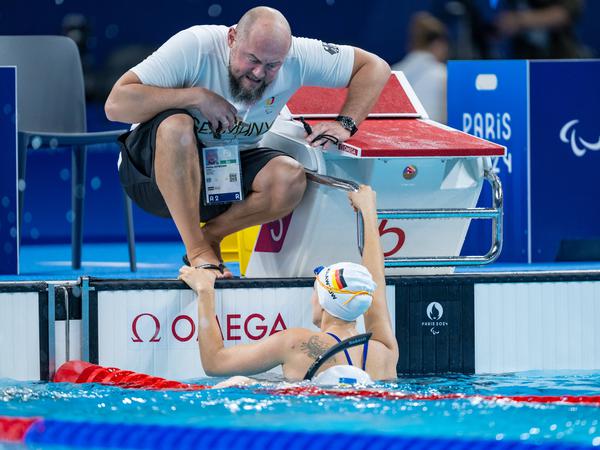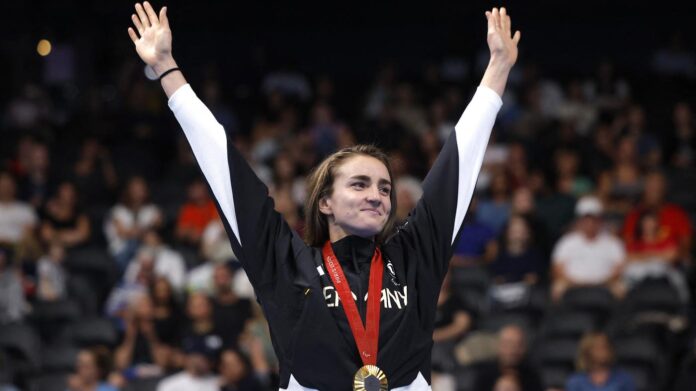Last Thursday evening, para-swimmer Elena Semechin set a new world record in a sensational final and became Paralympic champion in the 100-meter breaststroke. The past three years have been anything but easy for the visually impaired Berliner: In September 2021, just six weeks after her victory in Tokyo, Semechin was diagnosed with a brain tumor. For her, a fight for her own life and her own personality began.
In an interview with the Paralympics newspaper, she talks about her success in Paris and about how one should never lose faith in oneself and one’s dreams.
Ms Semechin, on Thursday you Defended her gold medal at the Paralympics and, on top of that, beat her own world record. Have you already realized your success?
The past few days have been intense. So many impressions, congratulations and emotions. I’m still overwhelmed and can’t quite comprehend it all. I still think I’m dreaming. I’m just fulfilled, happy, satisfied and grateful that everything worked out like this.
After the preliminary round on Thursday morning, your clear goal was to swim a new personal best. What were you ultimately happier about – the gold medal or the world record?
Definitely about the new personal best. That was a bit old. From 2019, to be precise. It was important for me to see if I could top my performance again. That was the biggest question for me in recent years. We worked incredibly hard for that, and my trainer did an incredibly awesome job. The fact that he built me up like that and got me to this performance is absolutely not a given. That’s why I’m so proud that we’ve now achieved this top result.
When did you realize that you had just set a world record?
In the water I was just happy – the race was great and I felt great. The atmosphere was so good that I wanted to join in the celebrations. On the block I noticed a light coming on. That meant I had won. When I came out someone said in passing: congratulations on your new world record. I couldn’t believe it and just thought to myself: what, me? Then the emotions kicked in and I started crying during the TV interview. It all overwhelmed me. I was so happy and I had to get it out. I was speechless and couldn’t say anything else. To be honest, I still am. I rarely am like that, but I was really stunned.
You wanted to beat your world record from 2019 and be a little faster than you were five years ago. How does it feel to fight against yourself and your former self?
I was actually relatively balanced and relaxed. I knew that we had really given it our all and had prepared really well. I specifically took the time. In the last three months before the games, I paid attention to myself, training and recovery. I knew that I had found the perfect balance and that the day had come when I could pick it up. Then I just focused on everything that we had practiced for hours, weeks and months. I wanted to put that into practice in the water. It was wonderful.
Have you ever swum this time in training before?
No, definitely not. Even at the last competition before the games (International German Championships in Berlin in June, editor’s note) I was very disappointed and sad. It really wasn’t a good race for me. I thought that maybe I wasn’t on the right track after all, as I had thought. It took me a while to believe again that I could do it. But little by little, that came when we got through tough sessions and pushed ourselves beyond our limits. Slowly, I became confident that it could work. That gave me the peace of mind I needed.
So was that really the best time you’ve swum in the final on Thursday since 2019?
I also had good results in training, but of course it’s always something different to then bring that onto the track. Especially at such a big event. The expectations were also quite high. There was a lot of attention. It was just a pressure situation, especially because there were so many spectators there. Among them were my family and friends, who were seeing me swim live for the first time. I was also afraid that I would fail. Or my head and nerves. But in the end I just managed to be myself on day X, to enjoy everything and bring it onto the track.
How did you manage to give 100 percent at that exact moment?
I actually just focused on the technique. Just like I do in training: counting my moves and not paying attention to anything other than the details. That was the main idea during the competition. Being with myself and the technique. In the last few meters I thought: OK, now all in. Everything that is still in me. To the wall and to the stop. Then it was enough. It was crazy.
Did you already realize during the race that it could be enough for the world record?
I wasn’t thinking about the world record yet. I just swam well and it felt good. But when you hit the water and don’t see the time, it’s difficult to estimate. It’s just a matter of tenths or even hundredths. But I had the race well under control and that was important to me.
You have a ring with the Olympic rings on it on the index finger of your left hand. Could you imagine taking part in Olympic competitions or even the Olympics?
It’s not that I dream about it or that it’s on my to-do list. Of course, I also enjoy competing with non-disabled people and I really enjoy training with other swimmers. I also like competing with people without disabilities. But I don’t try to emulate them and say that I want to compete at the Olympics. I just think it’s great and it’s the same for me. We just do it one after the other. But in principle we all do the same thing. It doesn’t matter whether it’s Paralympic or Olympic.
At your reception in the German House later on Thursday, you were again in tears. Were they tears of joy or did the burden of the last three years fall away?
I had to hold back a tear. I just wanted to be happy and excited. And I was, and I just beamed and laughed. It was such a wonderful moment in my life. I absorbed it all. I had no burden at all. It was pure fulfillment. It was such an incredible moment for me and it was so electrifying. It was simply overwhelming and I didn’t even know what was going on inside me. Oh my God, it was just a dream.

© IMAGO/Ralf Kuckuck
You have had an incredibly difficult time over the last three years since your cancer diagnosis. What does this victory mean to you now?
First and foremost, it was confirmation for me and perhaps for many other people out there. Maybe I can be a kind of example. It’s worth fighting and sticking with it. It’s worth never giving up and looking at things positively. It doesn’t necessarily have to be like it is for me in competitive sport. It’s also about banalities, like finding yourself again, doing your hobbies again or whatever. I hope that my success can be an example to many, many people. Everyone should hold on to their dreams and wishes and keep believing in them.
You have repeatedly stressed that you would not be where you are now without your husband and coach Phillip Semechin. How can we imagine this support?
We always keep it very clear: husband at home and trainer at the poolside. That is very, very important for both of us. When I came to Berlin, we weren’t even together. It was already clear to me back then: if anyone can make me a champion, it’s Mr. Semechin. I moved there from Bavaria. I just know that he has the know-how. In the end, it was the best decision of my life.
Was this also the case during your treatment?
During chemotherapy, I asked him what we should do now. I really wanted to stay in sport. When I asked him whether he still saw any chances, he answered with a clear yes. We wanted to try it and it was clear to us that we had to work together. Of course, he couldn’t decide everything and we had to coordinate and discuss a lot with each other. Above all, what my body could handle. Step by step and bit by bit, we pushed our limits and achieved it. Both privately as my rock and also as a coach I can rely on.
You will be carrying the flag for Germany at the closing ceremony this Sunday. Did you expect that?
No, not at all. Mr. Quade called me and told me this. I was totally surprised. There are so many successful athletes here with impressive stories. And of all people, I get to do this?! For me, these games are something very special and now I have the perfect ending. I can’t imagine a better end to the games. It’s an honor and I’m incredibly grateful that I get to do this.
Three years ago, you weren’t able to really enjoy your time because of your cancer diagnosis. How are you going to do it this time?
I’ll answer everything bit by bit and take my time with everything. Then I’ll tackle my to-dos one last time. I want to learn to sail. Spend a lot of time in Berlin with my family and friends. I’ve missed a lot of things in the last three years. Now we can catch up on that at our leisure.
You say yourself that you don’t really like being in the water. Nevertheless, you are an integral part of German para-swimming. Do you already have goals for the rest of your career?
I don’t have any new goals for today. We’re going to rest for a few weeks. Not just physically, but mentally too. Just to get some distance from all the pressure and competitive sport. And also to have time for other things, like working with the media and giving lectures. I really enjoy doing that. I want to be there for people and share this experience with everyone. That’s the priority right now.
